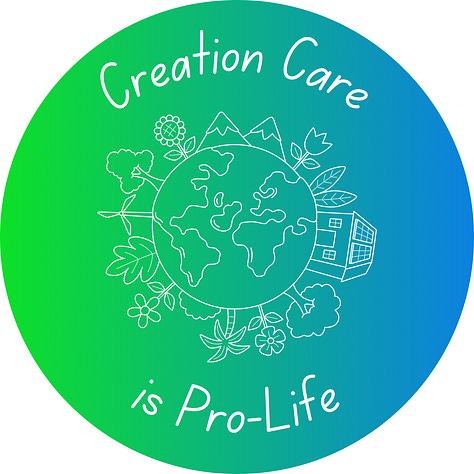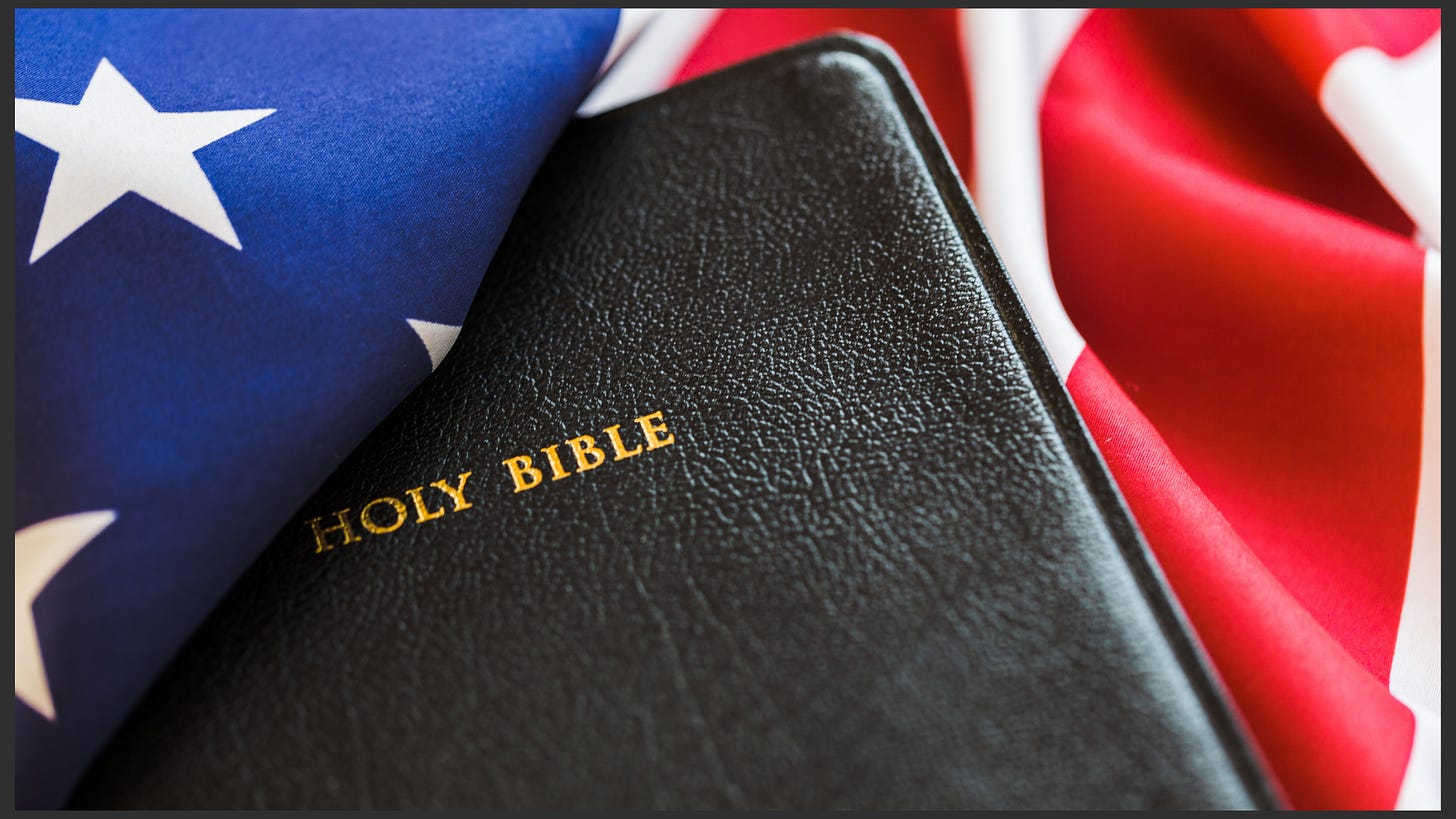God Isn't Concerned About America
But He does care about Americans and wants us to be far more concerned about our neighbor than political power
Like many Millenials and Gen Xers, I grew up in a Christian world becoming increasingly merged with politics. And despite the fact I didn’t grow up in an overly political household, I came to understand that to be a Christian was to vote pro-life and to vote pro-life was to vote for moral leaders…and those moral leaders most certainly belonged to the Republican party.
I was one year old when Ronald Reagan became president. While I didn’t have many feelings toward the man, I understood he stood up against the Soviet Union and the communist USSR was evil and therefore he was doing good things in the world. It wasn’t until decades later I would learn his presidency was far more complicated than that, his domestic policy causing harm that would impact me in adulthood and potentially reach into my children’s future as well.
I was 13 when Bill Clinton became president, and for some reason it would take reading the Bush twins’ book Sisters First before I comprehended his daughter Chelsea was my peer. My mother never liked him, and while I understood there were concerns about his stance on abortion, I didn’t fully understand why he was worthy of so much loathing. I was in college when the special counsel released its report on the Monica Lewinsky affair and it wasn’t until I was in my 30s that I finally realized Lewinsky had only been a few years older than me when she had her life destroyed by both sides of the political aisle. And again, it would take years for me to finally see the damage to our nation’s politics after the dust settled.
I was 22 when the Twin Towers fell. I voted for George W. Bush, twice. While I was learning to think for myself, my first vote for him was an extension of my upbringing. My second vote was because I still believed in what we were doing in Iraq. I would vote for Barack Obama in 2008 because I was ready to be done with war in the Middle East. While I liked John McCain, I did not believe he would do what was necessary.
And by the time McCain was the GOP nominee, I could tell the party had changed, and I didn’t like the direction it was going.
My Christian professors at my Christian university had made it abundantly clear to me that the United States was not a Christian nation. It was founded by individuals who were Christians, but it was a compilation of colonies founded for economic and religious reasons. And while modern Americans frustrated with the influence of religion in our politics love to knock on the Puritans, the reality is that modern American Christians who want to see more God in our politics wouldn’t love the Puritans either.
Yes, they were strict. Yes, their rules seem harsh to us today. But they also demanded far more from each other than most churches ask of us now.
Take, for example, John Winthrop’s speech/letter/sermon “A Model of Christian Charity,” from which Ronald Reagan took his famous line “shining city on a hill.” I highly recommend reading the whole thing, but while Reagan was talking about economic prosperity of the nation as a whole, Winthrop’s vision of flourishing was very different. He said
For this end, we must be knit together, in this work, as one man. We must entertain each other in brotherly affection. We must be willing to abridge ourselves of our superfluities, for the supply of other’s necessities. We must uphold a familiar commerce together in all meekness, gentleness, patience and liberality. We must delight in each other; make other’s conditions our own; rejoice together, mourn together, labor and suffer together, always having before our eyes our commission and community in the work, as members of the same body. So shall we keep the unity of the spirit in the bond of peace.”
Then he tells his listeners
For we must consider that we shall be as a city upon a hill. The eyes of all people are upon us. So that if we shall deal falsely with our God in this work we have undertaken, and so cause him to withdraw his present help from us, we shall be made a story and a by-word through the world. We shall open the mouths of enemies to speak evil of the ways of God, and all professors for God’s sake. We shall shame the faces of many of God’s worthy servants, and cause their prayers to be turned into curses upon us till wee be consumed out of the good land whither we are a going.
They were a city on a hill because everyone was watching them. They were to concern themselves with the complete flourishing of their community. And if they failed to care for the least of those in their mix, the judgment of the world would be on them. God’s judgment would be on them.
But Winthrop also knew they were a single colony. He did not envision expansion across a continent larger than he could imagine. He could not know that over a hundred years later there would be a desire to break away from England and form a new country. In fact, he didn’t concern himself with the other colonies at all. He just wanted to see the survival of the people in his charge.
He was not promoting American greatness. He was proposing a plan for human flourishing, even if he was ignoring the humanity of the people who already inhabited the land when he and his fellow Puritans arrived.
And yet, his words have been used to promote American greatness. The words of our other forefathers have also been used to argue American exceptionalism. Somehow, saying “All men are created equal” meant God ordained America to exist.
But Americans are not God’s chosen people. America is not a new Israel. The United States is less than 250 years old. The Roman Empire and the Greeks had far more influence in the establishment of Western civilization than the United States. The American Experiment was a hot mess for years after the first Continental Congress. It took six years after the Revolutionary War for the Constitution to be ratified, and for years after, there was plenty of infighting to figure out how to apply it to the realities of running a country. We fought a Civil War over our nation’s original sin, slavery. And then failed to rectify the harm done to those slaves when Reconstruction ended.
We are not a nation especially blessed by God. We are a ragtag nation of immigrants from all over the world who have somehow found a way to make it work. American individualism has been one of our greatest assets and one of our greatest weaknesses. Unlike our European allies, we only have two neighbors, and since the mid-19th century, we have been at peace with both. We have large oceans on either side of our continent, and for most of our history, we have been more at risk from hurricanes and earthquakes than from foreign nations wanting to do us harm.
My entire life, I’ve heard people argue that the reason the United States hasn’t been destroyed by our adversaries is because we are especially blessed. The secret to our success is our nation’s faithfulness to God. Terrible events like 9/11 are a sign we need to return to God.
But we are not special because God has intervened on our behalf. We just don’t have our foreign adversaries as literal neighbors.1
God doesn’t care if we pray that our nation turn back to God because he’s never concerned himself with America. He cares about Americans. He cares about how our public prayers for a return to Christian values are affecting our neighbors. He cares about whether we are attending to the needs of our fellow citizens. Whether our democracy lives or dies, God’s Kingdom will continue to reign, but how many of God’s children will be harmed in the pursuit for Christian dominance?
I think the Crusades, Inquisition, Indian boarding schools and many other historical events would have something to teach us about that.
God is not our fairy godmother. He cannot be manipulated into doing what we want because we go out of our way to force our beliefs and Christian ethics onto our neighbors. Jesus once told his disciples, “ “And when you pray, do not be like the hypocrites, for they love to pray standing in the synagogues and on the street corners to be seen by others. Truly I tell you, they have received their reward in full. But when you pray, go into your room, close the door and pray to your Father, who is unseen.”2 Jesus wasn’t telling his disciples—and us—that we shouldn’t publicly live our faith. He wasn’t telling us to not spread the Word. But he was telling us to be careful how we do so.
I am so tired of being told that God is so small, he needs human beings to save his Church. I’m so tired of being told that his vision for humanity is so narrow that a Christian-led American government plays a key role in saving the world.
I’d rather be part of a faithful minority creating meaningful change for my fellow citizens than a counterfeit majority forcing my way into power and influence.
And not that I can speak for the Almighty, but I believe God would prefer that also.
Support my writing
While most of my work here is free for all subscribers, it is still a labor of love that I fit into the few hours I have when I am not teaching or being an attentive wife and mom. If you want to support my writing but do not want to commit to being a paid subscriber, please consider a one-time donation.
You can also support me by ordering my book or books from my favorite book lists at my Bookshop.org affiliate page.
Check out my RedBubble store for related merchandise.



If you want to be a regular supporter, you can upgrade your subscription from free to paid and get occasional content only for paid subscribers.
And thank you for supporting my journey 💗
But we do have a serious problem with domestic terrorism. Christian Nationalism is one of the biggest threats to our national security right now. We need to be paying closer attention.
Matthew 6:5-6, NIV






Yes and amen!
Amen to that!